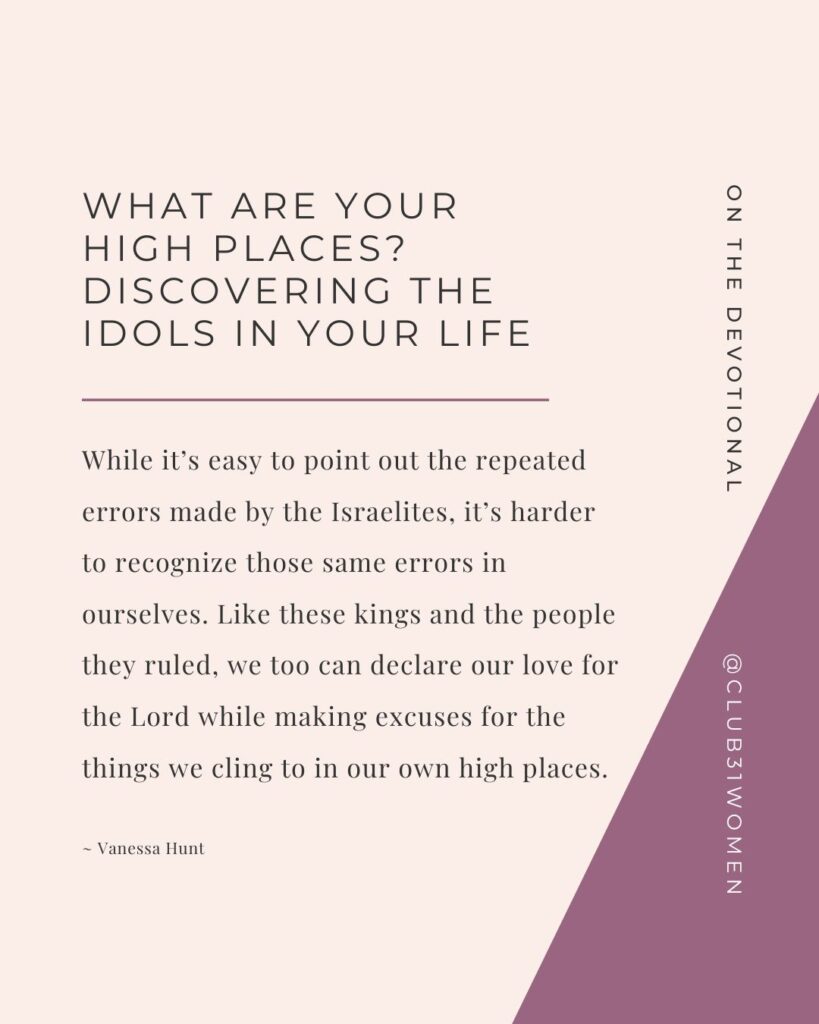What Are Your High Places? Discovering the Idols in Your Life
I have a confession to make. My Bible reading plan was going really well until I got to
the end of 2 Kings. At that point it became very hard to not simply skip ahead to Psalms or Proverbs where I knew I would find a few more uplifting and encouraging passages to read.

Many times I would catch myself muttering, “You just HAD to go and ask the Lord to give you kings!” as I shook my head at the Israelites. But as I neared the very end of that book, knowing full well that there were long genealogy chapters awaiting me in 1 Chronicles, I did my best to stay focused.
The Cycle of High Places
It was then that I noticed the repetition of a single act as the reign of almost all the kings was described. Every time a righteous king would tear down the high places it is recorded that his successor would rebuild them. This happened over and over again and I had to make sure I wasn’t just re-reading the same passage because it became such a familiar refrain.
What exactly were the high places?
“High places, very simply, were places of worship on elevated pieces of ground. High
places were originally dedicated to idol worship (Numbers 33:52; Leviticus 26:30),
especially among the Moabites (Isaiah 16:12). These shrines often included an altar
and a sacred object such as a stone pillar or wooden pole in various shapes identified
with the object of worship (animals, constellations, goddesses, and fertility deities). It
seems that, at times, high places were set up in a spot that had been artificially
elevated; 2 Kings 16:4 seems to differentiate the “high places” from the “hills.” The
Israelites, forever turning away from God, practiced Molech worship and built high
places for Baal (Jeremiah 32:35). Although King Solomon built the temple of God in
Jerusalem, he later established idolatrous high places for his foreign wives outside of
Jerusalem. Solomon’s compromise caused him to lose the kingdom (1 Kings 11:7–11).”
(GotQuestions.org)
The Cycle Continues
Perhaps the saddest account to read is that of King Josiah. He laid waste to the high
places during his reign, demolishing every nook and cranny and even went so far as to
spread the bones of dead men over them. But after Josiah’s death his son Jehoahaz
assumed the throne and immediately “did what was evil in the sight of the Lord.” (2
Kings 23:32).
It wasn’t the first time this happened, but it inevitably led to the capture of Jerusalem and eventually all of Judah. Often, as I’ve been reading through the Old
Testament, I’ve told my husband how very thankful I am that we are under the New
Covenant. And yet, I’ve also remarked at how unchanging humans have been from the
moment sin entered the world. While it’s easy to point out the repeated errors made by the Israelites, it’s harder to recognize those same errors in ourselves. Like these kings and the people they ruled, we too can declare our love for the Lord while making
excuses for the things we cling to in our own high places. They didn’t have a monopoly
on idolatry. While we may not have physical high places, we are certainly tempted to
build them in our hearts.

Three Types of Modern High Places
It would be impossible to list all the high places we could construct. So, I thought it
would be helpful to narrow it down to three categories where we see this happening the most.
1. Compromising on Scripture
As women, one of the greatest challenges we face is having our nature weaponized against us. God wired us to be empathetic, nurturing and compassionate. And with that comes the desire to be liked. But, in a world that tells us that kindness equals acceptance, we constantly bump up against the reality that the Gospel message is offensive to those who want to live according to their own version of the “truth”. There can be a temptation to compromise on God’s Word and what He clearly outlines as best for our flourishing but it’s critical that we remember that we cannot be nicer than God. He has determined what is good, right and true so we must learn how to show
compassion without compromise.
2. Disobedience of Commands
Most of us have the Ten Commandments memorized. But the reality is that there are many other commands in the Bible as well. Throughout God’s Word we find both positive (do this) and negative (don’t do this) commands about how we are to live our lives and obey God. Our sanctification as followers of Jesus is a never-ending process of denying the desires of our flesh to become more like Him. Just because we know that we will never be fully perfected on this side of eternity doesn’t mean that shouldn’t be daily “taking up our cross” in order to follow His commands even when
(especially when!) its costly.
3. Going Beyond Scripture
We’re warned repeatedly throughout the Bible that we are not to add or take away from God’s Word. But lately it seems like there are many who are teaching that we must do “extra” things to have a higher level of closeness with the Lord. A certain posture, repetition of verses or words and incorporation of practices that are not rooted in Biblical Christianity. These seem to be particularly popular among women as they make our feelings and experiences of primary importance. We absolutely must be on our guard and discerning lest we be led astray.
The sacrifice of Jesus Christ on the cross meant the end to all other sacrifices. But even in the New Testament with the security of the New Covenant, we see people attempting to return to the old ways of idolatry. We will definitely face similar temptations but as we are indwelt by the Holy Spirit we know we can ask for the high places in our lives to be revealed so that we can demolish them according to His power. “We demolish arguments and every pretension that sets itself up against the knowledge of God, and we take captive every thought to make it obedient to Christ.” 2 Corinthians 10:5
In His Word
“Formerly, when you did not know God, you were slaves to those who by nature
are not gods. But now that you know God—or rather are known by God—how is
it that you are turning back to those weak and miserable forces? Do you wish to
be enslaved by them all over again?” Galatians 4:8-9
Read through 1 Corinthians Chapter 10 as it serves as a warning to not repeat
the mistakes made by the Israelites.
In Your Life
- In which of the three categories listed above do you find yourself most
tempted to construct “high places”? - If you struggle with recognizing the areas in your life which might be
idolatrous, would you be willing to ask your husband, pastor or trusted
friend/mentor? - As you pray, ask the Holy Spirit to reveal your “high places” so that you may
confess them to the Lord.
We Recommend
‘When Truth About God is Exchanged for a Lie’ by Tim Barnett
This article is a powerful companion to this devotional because it tackles the same core issue that plagued Israel’s kings — exchanging the truth of God for man-made lies. Tim Barnett clearly shows how our culture continues this pattern today, reshaping God’s truth to fit personal preference and cultural trends.
If you’ve ever found yourself wondering how to stay faithful to God’s Word in a world filled with half-truths and distortions, this is an eye-opening and faith-strengthening read.

Let’s Connect
You can find Vanessa on her website At The Picket Fence where she passionately shares how to have peace in your heart and peace in your home. Join her also on Facebook and Instagram.
